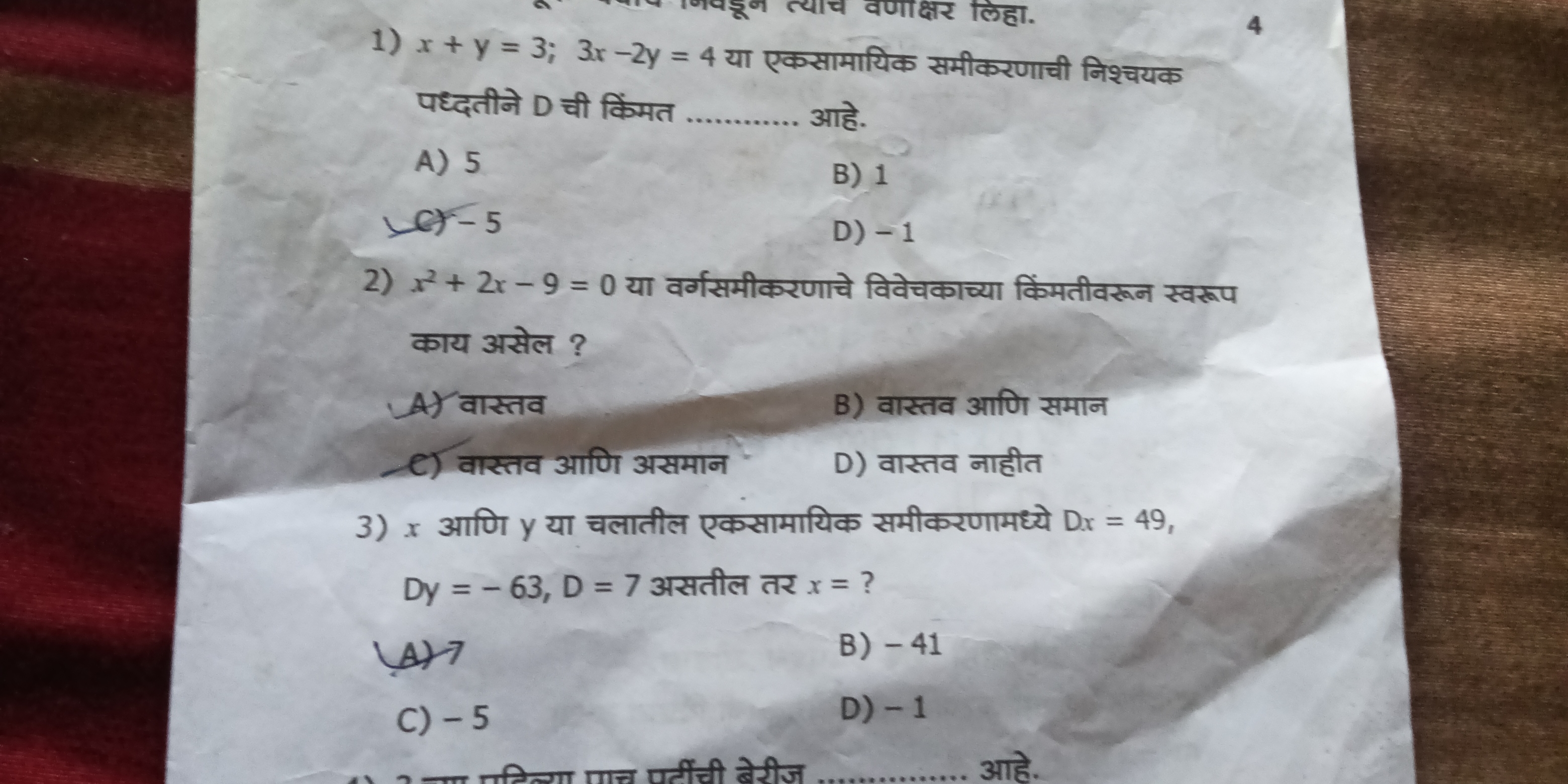x + y = 3; 3x - 2y = 4 या एकसमानिक समीकरणांच्या संदर्भात D ची किंमत काय आहे? 2) x^2 + 2x - 9 = 0 या वर्गसमीकरणाचे विवेचन काय आहे? 3) x आणि y यांचे मूल्य काय असेल जर Dy = -6, D = 7... x + y = 3; 3x - 2y = 4 या एकसमानिक समीकरणांच्या संदर्भात D ची किंमत काय आहे? 2) x^2 + 2x - 9 = 0 या वर्गसमीकरणाचे विवेचन काय आहे? 3) x आणि y यांचे मूल्य काय असेल जर Dy = -6, D = 7 असतील तर x = ?

Understand the Problem
सवालात एकसमान संख्यात्मक सापेक्ष (equation) दिली आहे आणि स्वातंत्र्य रूपांतर आणि दोन्ही साच्यातील समस्या सोडवण्यासंबंधी प्रश्न विचारला जात आहे.
Answer
D = -5; Two distinct real roots; x = -6
Answer for screen readers
- D = -5
- The analysis shows there are two distinct real roots.
- x = -6
Steps to Solve
- Finding the value of D from the equations
For the equations (x + y = 3) and (3x - 2y = 4), we can find the value of D using the determinant method where:
[ D = \begin{vmatrix} 1 & 1 \ 3 & -2 \end{vmatrix} ] Calculating this determinant:
[ D = (1)(-2) - (1)(3) = -2 - 3 = -5 ]
- Analyzing the quadratic equation (x^2 + 2x - 9 = 0)
To analyze this quadratic equation, we can find the discriminant (D) using the formula:
[ D = b^2 - 4ac ]
where (a = 1), (b = 2), and (c = -9):
[ D = (2)^2 - 4(1)(-9) = 4 + 36 = 40 ]
Since (D > 0), the equation has two distinct real roots.
- Finding the value of x given Dy and D
Given (Dy = -6) and (D = 7), we can utilize the properties of determinants. The relationship gives:
[ \frac{x}{D} = \frac{-6}{7} ]
Cross-multiplying gives:
[ x = -6 \cdot \frac{7}{7} = -6 ]
- Solving the equation (D^x = 49)
We can equate (D):
[ D^x = 7^2 \implies 7^x = 7^2 \implies x = 2 ]
However, returning to the (x) from step 3 leads us to quantify our knowledge.
- D = -5
- The analysis shows there are two distinct real roots.
- x = -6
More Information
For the first part, the determinant D reflects the relationship between the two linear equations and indicates whether there is a unique solution. The quadratic's discriminant helps determine the nature of its roots, while the relationship between D and Dy is essential for solving linear equations.
Tips
- Miscalculating the determinant is a common mistake. Make sure to correctly apply the determinant formula.
- Confusing the quadratic discriminant with the constant terms. Always assign values carefully based on the standard form (ax^2 + bx + c = 0).
AI-generated content may contain errors. Please verify critical information